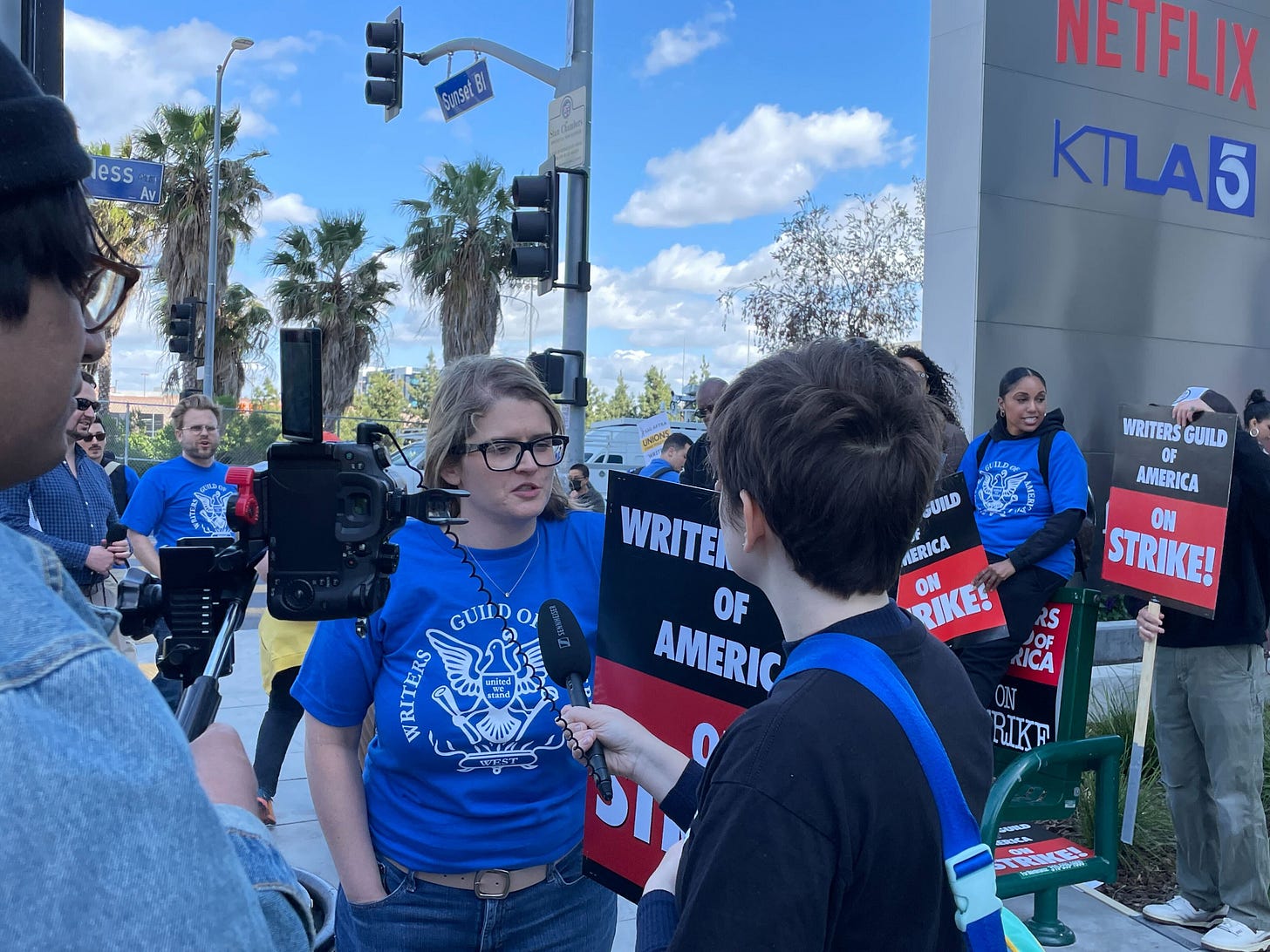WGA Lead Negotiator: ‘They Said They Had No More Moves to Make’
Ellen Stutzman reveals why it all fell apart earlier than expected last night

Big crowds, several babies and a basset hound took to the historic Sunset Bronson studio lot on Tuesday afternoon to picket outside Netflix’s L.A. headquarters as Hollywood writers officially went on strike. Also on the picket lines were WGA president Meredith Stiehm and the Guild’s lead negotiator Ellen Stutzman, the latter of whom spoke to The Ankler — over a cacophony of passing drivers honking in support — about what prompted an earlier-than-expected call for a strike, the threat of AI to the creative community, and where the writers and major studios could not come to agreement.
Q&A
The Ankler: Yesterday, the announcement [of a writers’ strike] came out a little earlier than people expected, since the deadline was midnight last night. Can you tell us what brought you all to that conclusion at that point in time?
Stutzman: Well, I think what happened is: We went into this negotiation six weeks ago with a very clear agenda, and told the companies repeatedly what the issues were, including writers telling them exactly what was going on in the business and what needs to be addressed. And they've mostly refused to engage on really important issues through the entire negotiation. So you get to deadline, and they just reject a lot of core proposals. There's really no possibility of making a deal in the final hours when they just won't even discuss.
Ankler: So it felt like that extra hour or two was not going to make a difference at that point?
Stutzman: Yeah, they just said they have no more moves to make right now, because we won't drop issues. And so we can't drop issues that are fundamental to writers. And that's how you end up here.
Ankler: [AMPTP] said the primary sticking points were staffing, minimums and duration of employment. Can you tell me about the discussion around those two points?
Stutzman: Well, I hope you saw our two pager, because you can probably see that the primary sticking points were a lot broader than that, since there were so many things that they just said “no” to. But writers have been pretty clear that they are concerned in the way the studios and the streamers are now hiring writers and expecting them to work — that if we don't have protections in the contract, things like a writers room won't exist anymore.
So it's a pretty fundamental thing for a union to do: to say, we're gonna talk about the number of people who are needed to do a job and how long they need to work. And that is how so much of the business operates. It's only in recent years that there's a handful of shows where there's maybe only one credited writer. But that's not the norm. And so what we're talking about is codifying the way the television business has existed for decades, and providing the most profitable content this industry and world has ever seen. And they just don't want to deal with them. And I think writers’ fears that they don't want to deal with it is because [the studios] absolutely intend to eliminate that work and put it on fewer people.
Ankler: What does it say to you that there was not a counter offer [on staffing minimums and duration of employment]?
Stutzman: It says that the companies don't want to do those things. The entire time, they've tried to treat this like a normal negotiation, where they'll give some modest increases that don't address inflation. And then they spend the next three years taking that money back out of writers’ pockets. We, in 2017, negotiated a span provision that helps protect writer pay. And they said, ‘Well, we'll just switch to weekly pay,’ which is fine. But we know that if we don’t negotiate clear protection, they will look for every loophole they can to avoid whatever gains they agreed to.
Ankler: Streaming was such a big part of that conversation that didn't seem to get resolved last time around, 15-16 years ago. When you're looking ahead now, do you feel like AI is taking the place of that part of the conversation?
Stutzman: You know, I think AI becomes more of a concern every day. Even over the course of the negotiations, what came out about AI — we need to regulate it in our agreement, because it has no business in writing scripts, when those services only exist because they took all the work that writers and everyone else have ever done and fed it into some program that generates text. And that should not replace writers.
Ankler: What's the timeline for going back to the negotiating table?
Stutzman: So the timeline is: when [companies are] ready to have a real negotiation and really address the concerns that writers have made so clear to everyone in this town, I think. But we're never acknowledged in that room.






"And so what we're talking about is codifying the way the television business has existed for decades." That does not sound like a winning strategy. :(